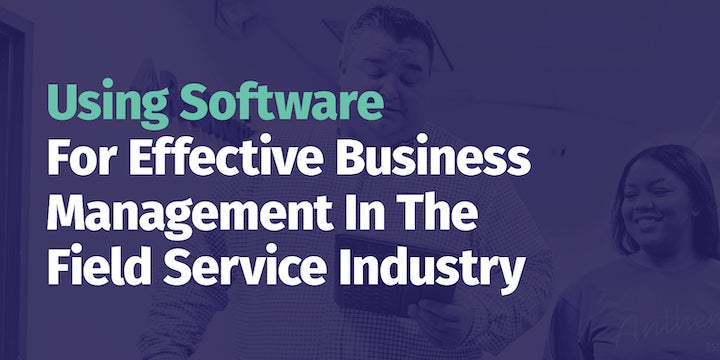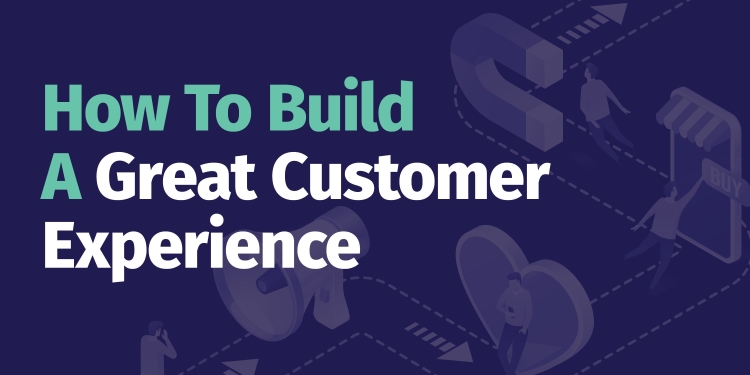How To Start Thinking About Franchising

For many ambitious business owners, the ultimate goal isn’t just to succeed at the local level: it’s to take over the world. How can you turn your local business into a nationwide brand? There is no one “right” answer, and it’s a question that you as a field service business owner will have to contemplate for the lifetime of your brand. However, there are a number of certain steps you can take at the early stages to maximize your potential as you grow from one business into a successful franchise.
Franchising is a business model designed to allow you, as an owner, to expand your business and your brand. As the franchise owner, you are responsible for providing your franchisees with a sustainable and effective business model that they can replicate at their own locations, in addition to providing them with the training and support they’ll need to succeed on their own. In return, your franchisees will expand your brand and business using their own capital and personal efforts.
Ideally, it is a system wherein both parties benefit: as the owner, you get to expand your business with minimal personal risk, while your franchisees will get to piggyback off your existing brand and business model to carve their own niche within the market you’re expanding to.
However, it’s never quite that simple. Building a successful franchise takes time, effort, and a considerable amount of planning to go smoothly, and there are a number of ways that the process can go wrong if you don’t take the adequate steps to prepare yourself. In this guide, we’ll take a look at the important details you need to keep in mind as you start thinking about beginning your journey into building a franchise, as well as the many ways that businesses like FieldRoutes can help you achieve your goals.
Is Your Business Franchisable?
The first question you have to ask yourself as a field service business owner is: Is my business franchisable? Do your individual and business goals align with the future you want to achieve as a franchise? Here are five important questions you need to ask yourself before you start the franchising process:
Is Your Business Successful?
This is the first and most important question. If your business is failing locally, it’s simply unfeasible to try to spread it to the regional level. Franchising requires developing an already-successful business further, taking the same business practices, branding, systems, and team and turning them into future franchisee partners. Without a proven track record of results, you’re only setting yourself up for bigger failures by trying to franchise before you’re ready.
Optimally, you should be building a new franchise not because it is some lofty goal to attain but rather because it is simply the natural evolution of your brand. Maybe you’ve found that you have more customers than you can reliably service, or your team is getting overwhelmed by the sheer volume of tasks they’re being assigned. These are good problems to have, and the solution is often to just keep doing what you’re doing with a fresh franchisee.
Can You Scale Your Current Business Model? Ultimately, the process of franchising is about taking a proven system that has worked for you and passing it on to your partners so that they can duplicate your success. By copying your overall business model, you allow another person or group to lower their risk by carrying your established brand into their next venture. However, your business model has to be scalable in the first place for this to work.
So you’ve developed a system that works at the local level. Can you replicate that success elsewhere? Can you support your new franchisees with the same products, systems, support, and expertise that made your original business such a hit? Logistically, can you keep your new franchise chains equipped with the necessary stock they’ll need to perform at the same high caliber that your established customer base has become accustomed to? Can you implement the same high-quality support systems (such as customer relationship management systems, call centers, etc.) at each franchise location? Will you be able to hire and retain the same high-quality people that put in the work at each site? And perhaps most importantly, can you do all of this and still be profitable?
Is Your Brand Solid? Your branding is everything when it comes to franchising. As the franchise owner, your brand is one of the primary assets you bring to be licensed and conveyed to further franchises. Is that brand secure? Do you own and control the business name?
Do you have a registered trademark with the United States Patent and Trademark Office for your brand? Do you control the website URL domain name? While the above questions help qualify you from a legal perspective, you also have to think about your brand in terms of your entire business ecosystem. What about your competitors? How generic is your brand name? Do you have competitors with similar or identical names? Is your brand truly solid enough to stand on its own in new and uncertain markets?
Have You Budgeted Effectively? So your business is booming, and you’ve set it up to be able to scale effectively as you expand. Or have you? Without a proper budget in place, you can’t be too certain.
What are your franchising goals? What is your timetable to achieve them? What are your budgetary constraints, and how will you overcome them? Have you determined the cost to launch a franchise along with the requisite infrastructure to achieve long-term growth? How much will it cost to register your franchise disclosure document (FDD)? How will you secure funding to move to the next level and open up a new location, etc.? How much will it cost to protect your branding and trademarks? What about the ongoing costs you’re about to incur, including legal costs and promotion, marketing, etc.? All of these costs will need to be accounted for before you can safely say that you have budgeted correctly
Can You Execute? Finally, are you truly prepared to execute the plan you’ve set up? Can you commit to your plan not only today but in five years? Is your potential franchise the natural extension of what you’re already doing, or is it a lofty goal that may or may not be realistic? Can you back up your big new ideas with the tenacity required to see them through to completion?
Successful franchises are not born overnight. Building a successful franchise requires not only a great product or service but also the commitment to keep building and growing every day.
If you’ve answered yes to all five of these big questions about your business’s ability to franchise, then it’s time to move on to the next step.
Developing A Business Plan
After concluding that your business is ripe with opportunities to franchise, the next step is to develop an effective business plan to get you there. We recommend developing a specific plan based on 1-year, 3-year, and 5-year intervals.
1 Year: What does the immediate future look like? How will you get your first new location(s) up and running?
3 Years: How will you continue sustained growth for all of your existing franchisees? Will you continue to open up new locations during this period or solely focus on making the most out of your existing ones?
5 Years: What are your goals for the long term? How will you prepare your franchise for continued sustainable growth into the future?
Your operational vision will encompass every aspect of your prospective franchise and will need to be developed for the business as a whole and for each franchisee.
Branding
Your brand encompasses all of the graphic and visual elements that define your business. It’s what sets you apart from the competition and what people will think of when they hear your name. Ideally, your branding will be what catches their eye and drives them to you in the first place, but only if you’ve taken the time to create a brand that’s both appealing and fiercely individual enough to make you stand out from an increasingly competitive marketplace.
Your branding includes:
Your name
Logos
Colors
Images
Mascots
Taglines and catchphrases
Fonts
Website
But it’s more than that— as a whole, your branding encompasses the entire customer experience you create and the entire customer culture behind every interaction you have. Your branding explains the “why” of your business. Why does your business exist? Why should a customer go to you and not your competitor?
It’s hard for any small business to succeed without great branding; for a franchise, it’s impossible.
If you’re looking to expand, now is the time to take a deep look at your brand. Make sure you have a name or service that quickly and succinctly sums up the product or service you provide as well as the customer experience you foster. As you expand, you need to ensure that no matter how far your reach, your brand still feels personalized to the people within the market(s) you’re trying to tap into.
Scaling And Streamlining
With your end goal established, it’s time to start streamlining your current operation so that you can easily translate that for your future franchisees. In order to stay competitive in your market, you’ll need Your Operation to be able to either create your product or service more cheaply, more effectively or both.
Scalability in business is when a new unit costs significantly less to manufacture than the last unit produced. For instance, as you grow, you may be able to cut down on your expenditures of certain materials that you previously had to buy individually now that you have the purchasing power to buy in bulk. Ideally, with a perfectly scalable business model, your cost to acquire new customers will not increase even as your overall production does. Once your franchise has taken off, you can expand with lower business costs by relying on your established brand name. This creates a snowball effect where your new franchisees will reduce the cost of their initial investment, making it easier and easier to grow.
This can take many forms. If you haven’t already, now is the time to review your current systems to see where upgrades or improvements are possible. In addition to reducing your costs, also look into ways that you can streamline your workflow. You should also consider how you can enhance your customer experience, such as gaining new insights into your target audience and tailoring your marketing efforts accordingly. Even with an established name brand behind it, a new franchisee will still have to “wow” customers in the area to stay successful, so now is the time to consider how you can start this next branch on the right foot.
Don’t be afraid to invest in improvements to your systems that could pay big dividends later as you continue to expand. Better to make these improvements now so that you can carry their benefits forward into every aspect of each new franchisee.
Training Your Team
Your new franchise cannot survive without hiring, training, and retaining the same high-caliber talent that made your business such a success in the first place. If you want to have the same impact in new markets, you will have to find a way to capture that same workplace environment that made your first business so successful.
While no two teams will be the same, there are some helpful measures you can take to help create the same workplace culture in your future franchisees, such as:
Operations Manuals : Create a comprehensive operations manual containing every aspect of your business that future owners will need to know. This should include big-picture operational information and specific elements of your workplace culture like uniforms, terminology, customer service guidelines, employee training requirements, and so on. Great operations manuals help foster great managers, which fosters great teams.
Centralized Training : If you want to establish a uniform customer service experience across all of your franchisees, the best way to do so is to ensure that everyone receives the same training. This can be done by taking new franchisees to the corporate office for training. This will allow new owners to see every step of your original business in action so that they know how to replicate your success. This also presents new owners with opportunities to ask questions and see in-person how you operate specific machines, follow certain procedures, etc. For the best results, include the entire team in these centralized training sessions so that everyone is on the same page moving into the new franchisee.
On-Site Training : After the team has seen how things are supposed to run at the original location, take off the training wheels by giving a thorough training on-location at the new site. This will allow you to gauge how well your training has prepared this team for the new location’s challenges while simultaneously giving you a bigger picture of what specific needs you might have to fulfill to help them succeed.
Continuous Training : Training never really ends. Even after your initial training sessions are complete, ensure that all your franchisees undergo ongoing training for all employees to make sure everything sticks and nothing is forgotten. These ongoing training sessions will also allow you to tweak your training processes as you go, taking the experiences you’ve learned from your first franchisee and providing this invaluable insight to the next.
Assessing And Reassessing : Visit your franchisees regularly to make sure all the knowledge you’ve tried to impart has been absorbed by the team. Make visits on a quarterly or annual basis to measure key performance indicators and make adjustments or schedule re-training sessions as necessary.
Remember that your franchise as a whole depends on the success of each branch as an individual and that the success of each branch depends on the people that make it run. Invest wisely in your people, and you will always see returns.
Location, Location, Location
The final big consideration when turning one business into a franchise is where your future stores or operations will be located. In fact, in many ways, the location of each franchisee is equally or even more important than the product or service you’re selling. You may be selling the tastiest apples in the world, but it won’t mean much if your next branch opens in an area where people are demanding oranges.
Before you make any moves, you need to take time to consider whether your proposed franchisee location is a good fit for your existing business. Likewise, the lack of viable locations to spread out to could mean that your franchise concept may not be a wise investment. You can’t create a new market on your own no matter what you’re selling; if you want to succeed, you need to find where your uncapitalized market exists already and take your business to them.
Franchisees of your business will come in two flavors, traditional and non-traditional.
Traditional locations are free-standing businesses, typically with their own parking lots. For these types of franchise locations, your business is the exclusive attraction housed within the building and is often the reason why the building was constructed in the first place.
Non-Traditional locations (also known as satellite locations), on the other hand, typically are not the main attraction within the building they operate inside. Non-traditional franchise locations include malls, retail stores, strip malls, airports, gas stations, and so on. A non-traditional location could be as big as a wing of a mall or as small as a single kiosk or cart.
The type of franchisee location you hope to open will go a long way in deciding where best to locate it.
Like with every other element of your prospective franchise, scalability is important. As the franchisor, you need to strike the appropriate balance between visibility and overhead. Having your own separate building is great for visibility and approachability but carries with it considerably larger rent than a building within a strip mall. On the other hand, while having your own building can help you stand out from the crowd, having your merchandise on display at the mall could attract the attention of window shoppers that otherwise would never know who you are or what service you provide.
Here are some good tips you can use and questions you can ask to help determine the best possible location for your next franchisee:
Is the prospective location highly visible? Is it close to roads, freeways, office parks, hospitals, or other factors that could attract passers-by?
How competitive is the location? Is it close to neighboring businesses that would compete with your business, or would the other businesses in the area actually complement your presence there?
How easy is the location to enter and exit? Is the site hard to find or a hassle to reach?
As your franchise grows, you will (hopefully) have prospective franchisees coming to you in hopes of opening a new franchise of your business at a location of their choosing. As the franchisor, you will have the final say in whether or not a new branch at this new location will be a help or a hindrance, so do your due diligence first!
Thinking About Franchising? Think About FieldRoutes
If you’re certain that opening a franchise is the right move, and you’ve done your research, now comes the hardest part of all— getting the funding to turn your dream into a reality.
In order to secure funding for your franchising venture, you’re going to need to have many facts and figures at your disposal that you can bring to the loan provider. That’s where partnering with FieldRoutes can help.
The FieldRoutes™ Marketing Suite excels at helping field service businesses grow and evolve steadily and sustainably. By partnering with FieldRoutes, you’ll receive:
A beautiful, responsive website
Effective, high-visibility branding materials
Guidance and goal-planning for short, medium, and long-term growth
Consumer reports
Dashboards detailing conversions, close rates, and campaign success rates
Seamlessly integrates with the FieldRoutes™ Operations Suite for a fully hands-free, automated experience.
Building your company into a franchise is a delicate and often scary process. Don’t go it alone— contact the professionals at FieldRoutes for help and get started building your successful business into a nationwide success.
Your Partner In Growth
We hope this guide has been helpful. Whether you’re looking to add efficiencies, make things easier for your employees, improve your customer service, increase sales, or anything in between, FieldRoutes is committed to helping your business reach its full potential. Our business management software and integrated marketing services are built with your customers and employees in mind and can help you achieve the growth you’ve always dreamed about.
Call for a Demo at 972.632.1923
Join the number of thriving businesses using FieldRoutes to acquire new customers, improve automation, and crush the competition.





